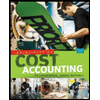a. Materials purchased on account, $2,270. b. Materials requisitioned and factory labor used: Job No. Materials Factory Labor 101 $2,270 $2,180 102 2,770 2,940 103 1,840 1,440 104 6,220 5,410 105 3,950 4,120 106 2,880 2,620 For general factory use 770 3,230 c. Factory overhead costs incurred on account, $4,340. d. Depreciation of machinery and equipment, $1,550. e. The factory overhead rate is $75 per machine hour. Machine hours used: Job No. Machine Hours 101 17 102 35 103 31 104 73 105 17 106 28 Total 201
Process Costing
Process costing is a sort of operation costing which is employed to determine the value of a product at each process or stage of producing process, applicable where goods produced from a series of continuous operations or procedure.
Job Costing
Job costing is adhesive costs of each and every job involved in the production processes. It is an accounting measure. It is a method which determines the cost of specific jobs, which are performed according to the consumer’s specifications. Job costing is possible only in businesses where the production is done as per the customer’s requirement. For example, some customers order to manufacture furniture as per their needs.
ABC Costing
Cost Accounting is a form of managerial accounting that helps the company in assessing the total variable cost so as to compute the cost of production. Cost accounting is generally used by the management so as to ensure better decision-making. In comparison to financial accounting, cost accounting has to follow a set standard ad can be used flexibly by the management as per their needs. The types of Cost Accounting include – Lean Accounting, Standard Costing, Marginal Costing and Activity Based Costing.
- Jobs completed: 101, 102, 103, and 105.
- Jobs were shipped and customers were billed as follows: Job 101, $6,870; Job 102, $10,000; Job 105, $16,250.


Trending now
This is a popular solution!
Step by step
Solved in 2 steps






